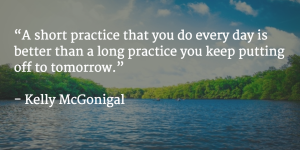1-Sentence-Summary: The Upside Of Stress helps you change your mindset from one that avoids anxiety at all costs to a belief that embraces stress as a normal part of life, which helps you respond to it in better ways and actually be healthier.
Read in: 3 minutes
Favorite quote from the author:

Audio Summary
Listen to the audio of this summary with a free reading.fm account:
When I saw Kelly McGonigal had another book out this year, I instantly had to take a look at the summary. The Willpower Instinct was one of my favorites, so only good could come from this.
The Upside Of Stress came out in May 2015 and argues that stress is actually good for you, as long as you have the right mindset about it. It also gives you actionable tips and tactics (all science-backed) to deal with stress the right way.
Her 2013 TED talk about the subject has close to 10 million views, so it’s fair to assume she’s on to something.
Here’s what I learned:
- Stress is only harmful to your health if you believe it is.
- The stress paradox says happy lives include stress.
- You can channel your stress into energy that boosts your performance.
Let’s dig in!
Lesson 1: Stress is only harmful to your health if you believe it is.
The very first study quoted in the summary found that high levels of stress increased people’s chances of suffering a pre-mature death by 43%.
Ugh.
How is she going to argue herself out of that one?
By looking closer. The above statement only holds true for those “who perceived that stress affects their health” and have high levels of stress.
The participants whose attitude was that stress had no negative effect on their health, but still had high levels of stress, were the least likely to die early.
How can that be? The answer lies in your brain.
Just like you can have a growth mindset, or a fixed one, believing that stress is a natural and helpful part of life is much more powerful than your personal preferences or any facts you learn about.
This will lead you to come up with good ways to deal with stress, ask for help when you need it and see stressing events as challenges, instead of trying to avoid it at all costs.
Even better news: You can learn to adopt this mindset!
Lesson 2: The stress paradox says that happiness and stress belong together.
Here’s the stress paradox in a nutshell: Stress is always part of a happy life, which means a totally stress-free life cannot be a happy one.
The Gallup poll finds around 40% of Americans struggle with stress daily. Other countries in Africa have much lower daily stress levels, the summary quotes Mauritania at 5%.
However, people in the US have a much greater average income, longer life-expectancy and higher standards of living, while African countries often suffer from crime, violence, hunger, corruption and civil wars.
A study done by Roy Baumeister (a pioneer of willpower research) in 2013, shows that we often believe the most stressful events in our lives to also be the most meaningful.
The most successful people are often crazy busy and very hard to reach, because they love their career and give it their all – a big part of the meaningfulness of their work is derived from the fact that it’s stressful.
Similarly, having a baby is often quoted as the best thing that ever happened, but no one would say it’s a cakewalk.
Just by remembering that happiness and stress go together like yin and yang you can already improve your attitude towards both of them.
Lesson 3: You can channel your stress into energy that boosts your performance.
Which one do you think is the better thing to tell yourself before a presentation, “I am calm” or “I am excited”?
It might be a surprise to you, but it’s the latter. Harvard professor Alison Brooks told two groups of her students to try these, and afterwards asked the crowd who performed better.
The group who tried to get excited was perceived as more confident, competent and graceful. That’s because they didn’t just try to calm down the anxiety, but instead, channeled the stress into energy, to make the presentation fun.
So the next time you’re stressed out, change that negative self-talk into something that’s not calming, but encouraging, and try to use that energy to make things happen.
The Upside Of Stress Review
As someone who’s constantly stressed out about even minor things and just trying to make stuff happen faster, The Upside Of Stress was not only a good read, it was also a necessary one.
I knew about the two kinds of stress, distress, which is bad, and eustress, which is good (the kind of stress when you’re positively excited about something), but I didn’t make the connection of turning one into the other.
I think lesson 1 is the most intriguing here, and once again shows the incredible power of the mind over the body. I’ll try to improve my attitude towards stress and see it as a good thing that I get to do lots of work, since it’s work that’s meaningful to me.
Who would I recommend The Upside Of Stress summary to?
The 14 year old high schooler, who’s worried about how she’ll do the first time she has to present something to the class, the 42 year old executive, who, in spite of liking his work, is afraid he might suffer from burnout, and anyone who spends their mornings rushing to work.
Last Updated on July 27, 2022